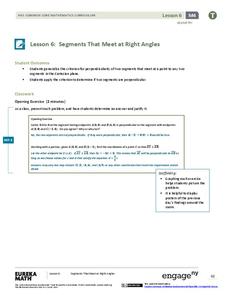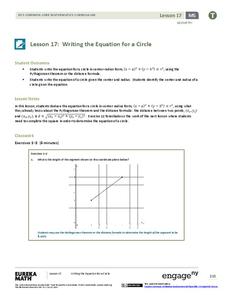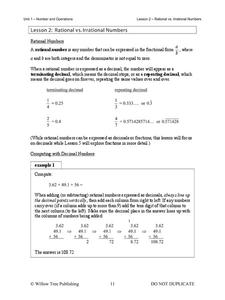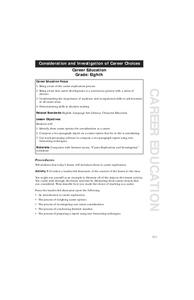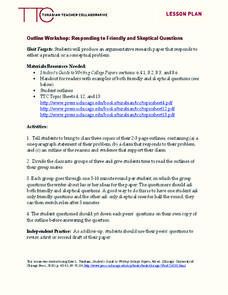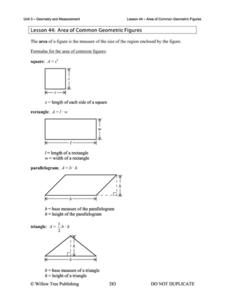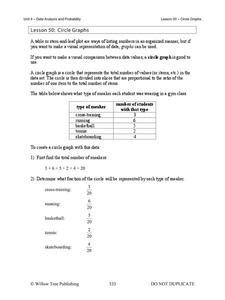EngageNY
The Distance from a Point to a Line
What is the fastest way to get from point A to line l? A straight perpendicular line! Learners use what they have learned in the previous lessons in this series and develop a formula for finding the shortest distance from...
EngageNY
Segments That Meet at Right Angles
Can segments be considered perpendicular if they don't intersect? Learners look at nonintersecting segments on the coordinate plane and make conclusions about the lines that contain those segments. They determine if they are...
EngageNY
Perimeter and Area of Triangles in the Cartesian Plane
Pupils figure out how to be resourceful when tasked with finding the area of a triangle knowing nothing but its endpoints. Beginning by exploring and decomposing a triangle, learners find the perimeter and area of a triangle. They...
EngageNY
Perimeter and Area of Polygonal Regions in the Cartesian Plane
How many sides does that polygon have? Building directly from lesson number eight in this series, learners now find the area and perimeter of any polygon on the coordinate plane. They decompose the polygons into triangles and use Green's...
EngageNY
Rectangles Inscribed in Circles
Putting a rectangular object into a circular one—didn't the astronauts on Apollo 13 have to do something like this? Learners first construct the center of a circle using perpendiculars. They then discover how to inscribe a rectangle in a...
EngageNY
Inscribed Angle Theorem and Its Applications
Inscribed angles are central to the lesson. Young mathematicians build upon concepts learned in the previous lesson and formalize the Inscribed Angle Theorem relating inscribed and central angles. The lesson then guides learners to prove...
EngageNY
Writing the Equation for a Circle
Circles aren't functions, so how is it possible to write the equation for a circle? Pupils first develop the equation of a circle through application of the Pythagorean Theorem. The lesson then provides an exercise set for learners to...
EngageNY
Ptolemy's Theorem
Everyone's heard of Pythagoras, but who's Ptolemy? Learners test Ptolemy's Theorem using a specific cyclic quadrilateral and a ruler in the 22nd installment of a 23-part module. They then work through a proof of the theorem.
EngageNY
The Multiplication of Polynomials
If you can multiply multi-digit integers, you can multiply polynomials. Learners use an area model to compare multiplying numbers to multiplying polynomials. They progress to using the distributive property.
Willow Tree
Rational vs. Irrational Numbers
Build an understanding of rational numbers and their counterpart irrational numbers. Lead learners through an explanation of rational numbers and the ways they can be expressed. Then introduce them to irrational numbers and make...
Learning for Life
Career Education
As part of a career exploration and investigation, learners research the Internet for possible career options and identify what type of educational preparation is required for those careers, as well as possible salary options,...
Willow Tree
Arithmetic and Geometric Sequences
Old mathematicians never die; they just lose some of their functions. Studying sequences gives scholars an opportunity to use a new notation. Learners write functions to model arithmetic and geometric sequences and use them to find new...
Turabian Teacher Collaborative
Outline Workshop: Responding to Friendly and Skeptical Questions
Answering questions is the best way to hone and revise your argument. Foster receptive writers with a workshop activity that promotes peer editing and argumentative writing skills. Given lists of both friendly and skeptical...
Willow Tree
Systems of Equations
Now that learners figured out how to solve for one variable, why not add another? The lesson demonstrates, through examples, how to solve a linear system using graphing, substitution, and elimination.
Willow Tree
Weighted Averages
Mixtures, weighted percentages, and varying speeds make problem solving difficult. The resource give learners a strategy for tackling these types of problems effectively.
Willow Tree
Angle Sum Property of Triangles
All triangles have some things in common. Using these properties of triangles, learners find missing angle measures. Scholars use the Angle Sum Property and properties of special triangles throughout the lesson.
Willow Tree
Midpoint and Distance Formulas
The shortest distance between two points is a straight line. Learners use the Pythagorean Theorem to develop a formula to find that distance. They then find the midpoint using an average formula.
Willow Tree
Dimensional Analysis
Convey to your pupils the importance of units, then show how to use dimensional analysis to perform a unit conversion. The math lesson plan includes detailed worked-out solutions to guide learners in their practice.
Willow Tree
Area of Common Geometric Figures
Scholars can use area formulas, but can they apply what they know about area? The lesson challenges learners to think logically while practicing finding area of shapes such as rectangles, circles, parallelograms, triangles, and other...
Willow Tree
Surface Area of Three-Dimensional Figures
Lateral area and surface area are simple concepts, but calculating them is not as easy! Using formulas, learners calculate lateral area and surface area for the same three-dimensional figures. The resource discusses the formula variables...
Willow Tree
Circle Graphs
Pie isn't just for eating! Scholars learn to create pie charts and circle graphs to represent data. Given raw data, learners determine the percent of the whole for each category and then figure out the degree of the circle that percent...
Willow Tree
Extremes, Range, and Quartiles
The middle of the data is important, but what about the rest of it? The lesson plan shows learners the importance of the range, quartiles, and extreme values. Pupils practice finding each of these values from given data sets.
Willow Tree
Data Sampling
Some say that you can make statistics say whatever you want. It is important for learners to recognize these biases. Pupils learn about sample bias and the different types of samples.
Utah Education Network (UEN)
Operations with Rational Numbers
Add an engaging resource to your lessons on rational numbers and watch your pupils' understanding multiply. Learners determine rules for adding, subtracting, multiplying, and dividing integers. Individuals then extend these rules to all...
Other popular searches
- Diverse Learners
- Kinesthetic Learner
- English Language Learners
- Adult Learners
- Kinesthetic Learner Math
- Literacy Kinesthetic Learner
- Diversity of Learners
- Second Language Learners
- English Learners
- Learner Log
- Lessons for Diverse Learners
- Community of Learners

